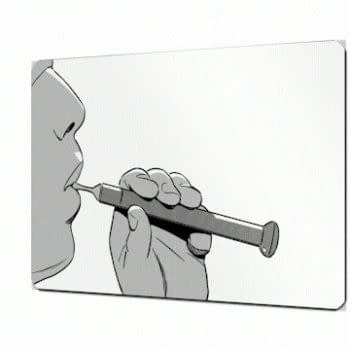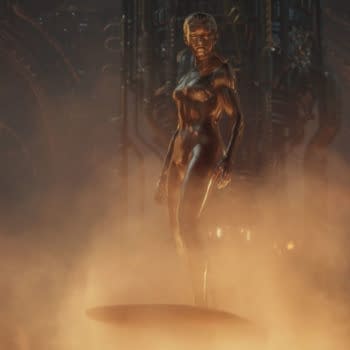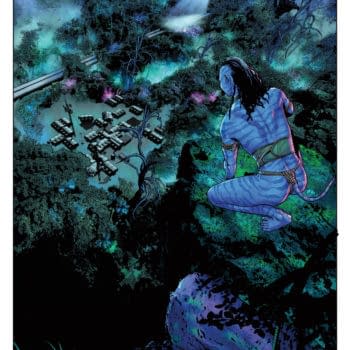Posted in: Comics | Tagged: brian wood, Briggs Land, Comics, dark horse, entertainment, Mack Chater
Brian Wood On The Two Briggs Land And Writing Without An Agenda
Yesterday I ran an interview with Mack Chater about the Dark Horse series Briggs Land and we showed you most of the first issue. Today we have the series writer Brian Wood talking about the parallel creative path of the project as both a comic series and a television series. We also have some exclusive preview pages from the fourth issue below.
DAN WICKLINE: Briggs Land is very different from most comics on the shelves today. What about it made you feel that this was the right medium for this story?
BRIAN WOOD: The path that Briggs Land has taken in its development phase has been pretty different from how it usually goes for me, and its not one I've really spoken in detail about before. This is a roundabout way of answering your question, but I'll get there in a bit. Briggs Land was originally conceived as a comic series, my next big multi-year project in the Channel Zero > DMZ > The Massive progression of political and socially conscious comics. I wrote a pitch, and then I showed it to my friend at AMC, Brian Bockrath, who I've known for about 6 years. I show him all my pitches, on the extreme off-chance that they'll be interested in it. And they were! So that's how I got to the point I'm at, where I sold the thing for TV before I made deal for the comic at Dark Horse, even though it was intended as a comic first and foremost.
So it's both and at the same time the right material for comics, and for television. I'm writing both, simultaneously. As a comic, its unfolding a little slower, since the 'container' of a 22-page comic is smaller than an hour-long premium cable show, which requires a hell of a lot of story and there's an expectation to get into the meat of it much quicker. In my head, it's two separate Briggs Lands – the one for comics, which is being done one way, and the TV one, which I'm developing differently.
It can be hard to keep it all straight in my head. But I value the experience. And the team I have helping me out are just great… Dark Horse Comics, Mack Chater, Lee Loughridge, Tula Lotay, Matthew Woodson, Nate Peikos, Spencer Cushing, all helping to see this project through. And then my producing partners at A24 and AMC, nothing but support and enthusiasm. I'm blessed.
DW: There have been cases of families and communities such as this on the news over the years. What was the inspiration for this story?
BW: I had done some research into the world of right wing militia way back in 2003 when I was developing DMZ. I didn't get that deep into it, but the books I bought and read have been sitting on the shelf in my office, and the mental seed had been planted. Then, a few years ago, I was writing Rebels, which dealt with American militias, but the historical kind, the "good" kind, as most people think of them. That contrast, between the then and the now struck me, and that was when I started thinking there was maybe a chance for me to write about modern day militia, and the extremist culture. The 2014 Bundy standoff was in the news, which helped focus me. I think it was that event, and some books I read on Ruby Ridge that really helped Briggs Land come together in my head.
And, like everyone out there, especially comic book writers, I love the Sopranos and always wanted to write a crime family, heavy on the family.
DW: Everyone in the book has their own personal agenda, though Grace's agenda seems to take other people into account. But does the book have an agenda? Is there a message or moral you are trying to convey with this series?
BW: Grace very clearly has a mission she wants to see through, based on a lifetime of history where not all of it was something she's proud of. She's probably the closest we have to a 'good guy' in the story, but that comes with footnotes and conflicts and contradictions, because she's also a crime boss and living in opposition to the government, and in order to see that mission through will likely involve doing some ugly stuff from time to time. The same is true of her family – the overall goal is to live their lives with the freedom of privacy and according to their own moral compasses – what will they have to do to maintain that?
But does the BOOK have an agenda? No, I don't think so. I mean, one note I give to the art team is that we need to take these people seriously in the story, not to depict them as rednecks or hillbillies or as some sort of monster because they open carry or live off the grid. I want to write them in a way that's honest and open, to not pick sides as a writer. So maybe that's an agenda? Probably more like a technique than anything else.
Something I learned on DMZ was the value of giving the audience a chance to feel what they want to feel and form an opinion of their own, as opposed to having a very clearly explained "good" and "bad", particularly when dealing with social issues.



















